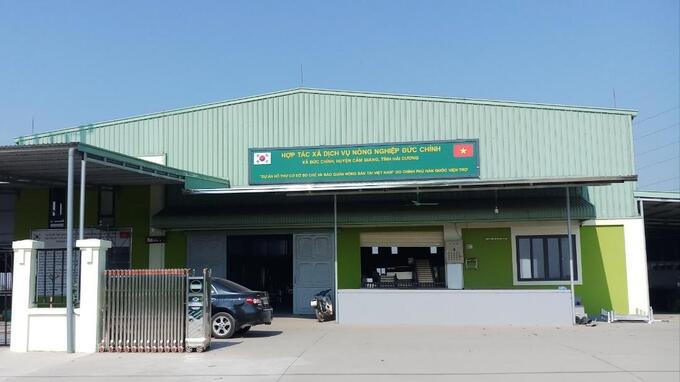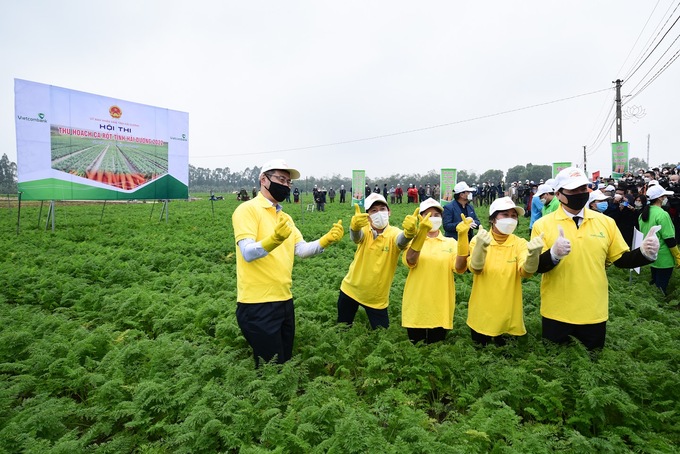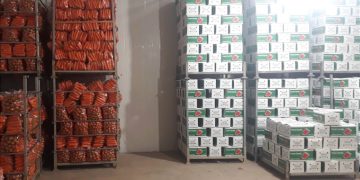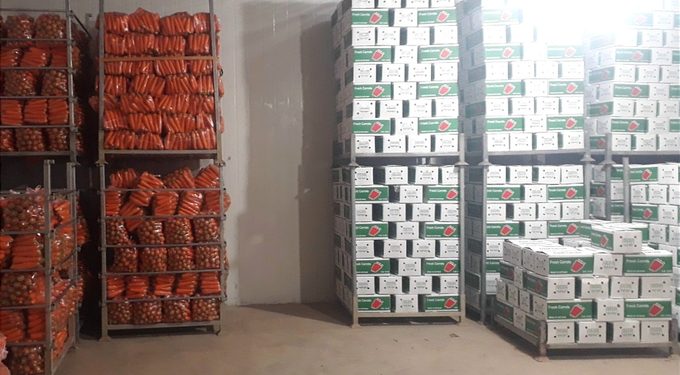An impact from the ban in Korea immediately affected carrot growers in a commune of Hai Duong. Stories from science and technology, cooperatives, the impact of management agencies…
My colleague and I went to Duc Chinh commune, Cam Giang district, Hai Duong province on a winter morning, the sun was as yellow as the autumn sun, the field of green carrots was immense, automatically watered by sprinklers. Welcoming us was Mr. Nguyen Duc Thuat, Director of Duc Chinh Agricultural Service Cooperative. As always, I asked him how the price of carrots was this year, advantages and disadvantages in production and consumption. Mr. Thuat said that this year’s winter crop was unusually warm at the beginning of the season (October and November, the highest temperature is still above 30 degrees Celsius), so early tea carrots have sharp roots and large cores. Fortunately, December is cold, the quality of the later teas will be good. Sadly, the price of carrots in Duc Chinh decreased, by just over half compared to the same period last year.
Thuat’s assessment and comment, the cause of this year’s drop in carrot prices is that Chinese carrots are still being exported to him. Workers in the southern industrial zones are unemployed, so the amount of cabbage and carrots consumed in these areas has decreased. In addition, adverse weather at the beginning of the crop led to ugly, pointed, large core carrots, bad shape…
Another obstacle is that Korea has suspended the import of tubers and tubers (the edible part lying on the ground) from October 3, 2022. This is the second time South Korea has issued this order. The reason is that they discovered the nematode Radopholus similis in banana tubers (the true stem of bananas) exported to Korea. But Korea is the market that consumes 80% of large carrots, so the export of Duc Chinh carrots to this market has recently been halted.

What Thuat looks forward to the most is the reopening of the Korean market for carrot products. More than 20 Korean companies are waiting to import carrots from Duc Chinh. It is known that the Sub-Department of Cultivation and Plant Protection Hai Duong has reported this matter to the Plant Protection Department and the Department has had a dialogue for the Korean side to lift the ban.
Regarding the recent suspension of imports of carrots and a number of Vietnamese agricultural products into Korea, the Plant Protection Department said: Following the direction of the leaders of the Ministry of Agriculture and Rural Development, the Department of Plant Protection has urgently negotiated judge and provide relevant technical documents. Korea has officially announced the lifting of the ban from December 21, 2022 with the condition that the Plant Protection Department closely inspects to ensure that shipments exported to Korea are not infected with Radopholus similis nematodes.
I asked Mr. Thuat: “Are you and your relatives satisfied with what the Project to support preliminary processing and preservation of agricultural products in Vietnam brings?” (it’s a project funded by the Korean Rural Community, the Korean Ministry of Agriculture, Food and Rural Affairs, and supported and implemented by the Vietnam Academy of Agricultural Sciences).
“Very satisfied, sister. With a preliminary processing capacity of 100 tons of carrots/day, 3,000 tons/month in 5 months of harvesting carrots/year, 15,000 tons of carrots are exported from the preliminary processing facility financed by the Project. After harvest, carrots must be washed through 5 water, stored in cold – 3 degrees Celsius for 16-24 hours until the core reaches 8 degrees Celsius. But that’s the tangible value, the intangible value the project brings. Since the project started, many Korean companies have come here directly to buy carrots.We negotiate the price directly with them, unlike before, they buy through middlemen. and relatives are forced to price. Companies directly contact us via Zalo, here I show you …”, Mr. Thuat shared.
Thuat took out his phone to show me the message. Very happy when a company messaged Mr. Thuat that carrots were allowed to be exported to Korea and they wanted to buy them in January 2023. Mr. Thuat was very happy and excited to share: “More than 20 Korean companies want to buy Duc Chinh’s carrots. Samsung Group buys Duc Chinh carrots from 2021. In the near future, Deputy General Director of Samsung will visit the company. sister cooperative”.
It can be said that this project also promotes other projects to support the concentrated carrot production area in Duc Chinh commune. Hai Duong Provincial People’s Committee has also invested in expanding the main road of the carrot field in Duc Chinh commune from 3m to 6m to facilitate the transportation of carrots, and invested in an economical watering system (spray irrigation). 100ha of carrots outside the dyke, irrigation water is taken from Thai Binh river.

About product safety: In order to export carrots, farmers are forced to comply with regulations so that the product meets the buyer’s requirements. In 2020, a company exporting carrots to Japan was returned due to excess Hexaconazole residues. People have treated the dried rotten tubers with milk medicine, active ingredient Hexaconazole, and watered the beds (the amount used is too much). Hai Duong Plant Protection Department has trained farmers to only spray on the leaves, not to water the ground when dealing with plant diseases (watering the drug solution into the soil is not only a matter of residues in the product but also kills microorganisms). beneficial in the soil).
Hai Duong Plant Protection Department also guides the isolation period of 25-30 days. From there, carrots can only be exported when the quarantine period is at least 25 days and there are no longer residue problems. With an area of carrots of the whole commune in 2019 is 360ha, from 2021 it is 380ha, plus about 1,000ha of land outside the commune people rent to grow carrots each year, the average yield is 51 tons/ha, revenue from carrots of Duc Chinh commune in 2019 is 170 billion VND, increasing to 300 billion VND in 2022 (actually the revenue of carrots grown from the winter 2021 crop).
We congratulate Mr. Thuat and carrot farmer Duc Chinh. Compared to 2019, the cooperative believes in the future of carrots much more. Remember back then, when I asked about the difficulties in producing and consuming carrots, Thuat said: “The people of Duc Chinh can produce carrots exactly as the market requires, but the market is unstable, so it can’t be helped. devaluation season”. Now it’s different, Thuat believes that with the current expansion of the market and trusted products, farmers still get a good harvest.
Carrot prices in Hai Duong inched up after South Korea lifted the ban. The selling price of carrots of Duc Chinh Cooperative is currently 8,500 VND/kg, 500-1,000 VND/kg higher than last week.
According to the Agricultural Service Cooperative of Duc Chinh Commune (Cam Giang), up to December 27, there were 9 Korean enterprises to survey and sign contracts to consume carrot products for the winter-spring crop in 2022-2023.
In order to promote the export of agricultural products, especially carrots, to Korea, the Plant Protection Department requires the Plant Quarantine Sub-Departments to immediately perform the following tasks:
- Strictly check the origin and status of harmful organisms for export shipments, especially fresh tubers, to ensure that they meet the phytosanitary regulations of Korea.
- The phytosanitary certificate for export should clearly state that the origin of the agricultural product is from Vietnam and write the English sentence in the additional declaration: “This shipment (including growing media for plants for planting) was inspected and found free of charge. Radopholus similis”.
- In case of exporting plants with removed growing media, in addition to meeting the above requirements, the phytosanitary agency must check and confirm that the growing media used in the sowing process is not contaminated with R. .similis.
- Do not issue phytosanitary certificates for export to Korea for plants of genera Anthurium, Philodendron, Monstera and Anubias until there is a notice from the Department on the conditions for exporting these plants to Korea.
- Requesting heads of units to direct and thoroughly understand all plant quarantine officers in their units and notify and guide exporting enterprises to strictly implement the above-mentioned contents. In the course of implementation, if there are any difficulties or problems, please report them immediately to the Department for timely settlement.
A source: https://nongnghiep.vn































